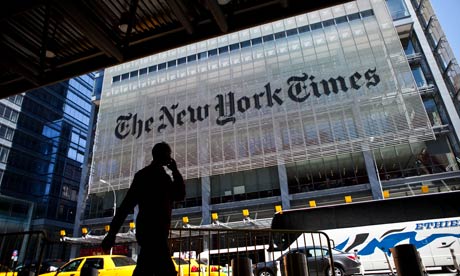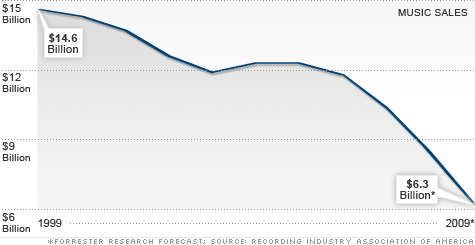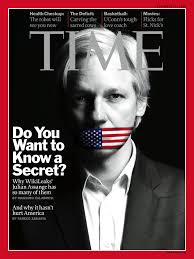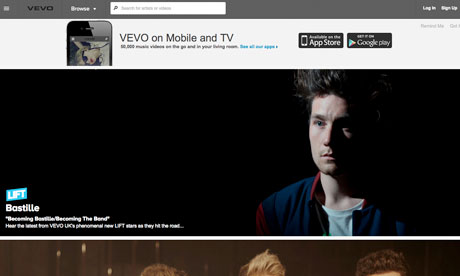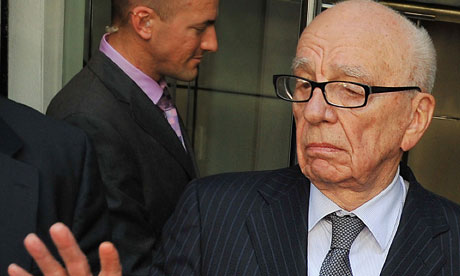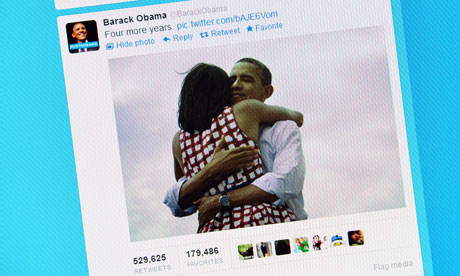Wednesday, 27 February 2013
Thursday, 7 February 2013
News Story WEEK 16: The New York Times Profits Boosted By...
http://www.guardian.co.uk/media/2013/feb/07/new-york-times-increase-profits
- Advertising revenue for The New York Times has dropped but overall sales and circulation has increased
- Total revenue has increased by 5.2% to $575.8m from $547.4m
- Advertising revenue decreased by 3.1% as National advertising dropped by 10%
"2012 showed both the opportunities and challenges we face as a company," said Thompson, president and chief executive officer. "We saw continued strong growth in digital subscriptions as well as increased revenue from our large print circulation base."
As a broadsheet and as one of the definitive New York newspapers, I believe it is easier for The New York Times to maintain loyal readers although online demand has dropped. However, The New York Times circulation has increased so the general decline in newspaper revenue may be due to lack of quality from some papers. Also advertising revenue declining may be worrying for newspapers as companies not showing faith in newspapers could possibly be the main reason which could lead to the decline of the print industry.
Wednesday, 6 February 2013
New and Digital Media Case Study: The Music Industry
Has new and digital media had an impact upon ownership and control of the media institution(s) involved in your case study area? Explain in detail any impact and what exactly has changed.
There hasn't been any evidence to suggest that new and digital media has impacted ownership in the music industry as it is still dominated by the four big companies (in order): Universal Music Group; Sony Music; Warner Music Group ;and EMI. Pareto's law can be applied as only four conglomerates dominate such a vast industry. Although artists are forming their own record labels to obtain the maximum amount of money from sales therefore cutting out the 'middle man'. Record labels are now fighting for control from consumers as the number of illegal downloads increase. This has come from the rise of new and digital media as prior to this people would record songs from the radio onto cassettes.
However, audiences are gaining more control over the music industry as they decide what they want to listen to. For example, Psy's Gangnam Style is now the most viewed video on YouTube with over 1.2 billion views. Prior to this Psy was virtually unknown to the western world. Record labels and artists alike are struggling with the rise of illegal music downloads which is more prevalent because of new and digital media. Sony Music for example, used to have complete control of where their products were distributed in the form of CD's which could be played their own portable CD players, the Walkman. However as online downloads have increased in demand, Sony are now trying to combat piracy by using their own software, Music Unlimited which exclusively distributes for Sony Music artists.
Jermain Dupri talking about new and digital media affecting the music industry and how artists may distribute directly in the future.
https://www.youtube.com/watch?v=IxhSgoMTNM0
Guardian Article 'Music industry struggles to make digital leap of faith'
http://www.guardian.co.uk/media/2011/jan/31/music-industry-digital-midem
What impact has there been on the way in which the audience now consume the media products/ texts involved in your case study? How does it differ from what went before? Consider (SHEP)
social - early social trends dictated that music had to be listened to on CD/Vinyl or live at a concert. For example, in 2006 55% of all music sales where sold as physical copies but that number has dropped to just 29% as of 2011. Worldwide revenue from physical copies has also fallen from $33.1bn to $19.9bn from 2006 to 2011.This may be because there are more digital sales from outlets such as iTunes and Zune; but the rise of new and digital media has lead to the increase of piracy from illegal downloads. 54% of those that stream music online are male whereas 46% are female. Norway is the leading market in music streaming. 16.4 million streaming customers.
historical - the music industry has come a long way form the era of record players. New artists are also gaining popularity from social media which is a part of new and digital media. For example, artists such as Hoodie Allen solely rely on social networks, especially micro-blogging sites such as Twitter (https://twitter.com/HoodieAllen) and realising singles on iTunes allowing fans to purchase them. There are many new artists who rely on this hence Billboard, the American charts authority, has created a chart for unsigned artists who still make sales. This is astonishing to think as prior to 1895, recorded music did not exist and all songs were heard through live concerts. Nowadays, it seems that artists are adopting the earliest techniques and relying on concerts for a majority of their income. Broadcast music was only introduced in 1918 in the form of radio and listeners had to wait another 2 years for scheduled radio entertainment. 1930 may have been the start of piracy as tape recorders were introduced.
economical - Revenue for music has generally fallen as a direct result of music piracy. However, the mobile market has aided music sales as worldwide industry revenue has grown to 10.8% in 2011 from 1.6% in 2006. This may be in direct correlation to the rise in popularity of the Apple iPhone.
political - Governments have tried to introduce legislations to prevent illegal downloads. However as this article (http://www.soundonsound.com/sos/jun00/articles/cutting.htm)
states, it is very difficult to control the copying and distribution of any files over the internet, especially sound(music)files.
Media institutions such as Universal Music Group, Sony Music, Warner Music Group and EMI (the big four) are preparing for changes with artist's mentality and more importantly, consumer mentality. Since 2000, album sales have fallen by 8% each year(http://money.cnn.com/2010/02/02/news/companies/napster_music_industry/). Napster (originally a peer-to-peer music sharing service) had 60 million users before the introduction of iTunes which got consumers to pay for music. These 60 million users would have moved elsewhere on the vast treasure trove that is the internet to look for other ways of downloading music for free. In fact, copy cat services were introduced by anarchists in the wake of Napster's forced shut down such as Grokster and Madster. Large music conglomerates were smart to target distributors of software having successfully forced Morpheus' distributor into bankruptcy. However, they are struggling to compete as more and more of the general public learn complicated computer programming especially in Eastern countries where piracy laws are less strict.
The past then suggests that music is bound for a future of financial struggle and possibly the collapse of one of the big four in the next two decades. Music however more than other sectors of media induce great loyalty from fans so although album sales may be falling, live performances are still highly valued and better yet are one of the few aspect of music where revenue is increasing along with digital downloads. Multi-genre festivals such as Coachella, Summer Jam and Glastonbury are encouraging fans to listen to a variety of genres giving lesser artists a chance to increase their fan base.

There hasn't been any evidence to suggest that new and digital media has impacted ownership in the music industry as it is still dominated by the four big companies (in order): Universal Music Group; Sony Music; Warner Music Group ;and EMI. Pareto's law can be applied as only four conglomerates dominate such a vast industry. Although artists are forming their own record labels to obtain the maximum amount of money from sales therefore cutting out the 'middle man'. Record labels are now fighting for control from consumers as the number of illegal downloads increase. This has come from the rise of new and digital media as prior to this people would record songs from the radio onto cassettes.
However, audiences are gaining more control over the music industry as they decide what they want to listen to. For example, Psy's Gangnam Style is now the most viewed video on YouTube with over 1.2 billion views. Prior to this Psy was virtually unknown to the western world. Record labels and artists alike are struggling with the rise of illegal music downloads which is more prevalent because of new and digital media. Sony Music for example, used to have complete control of where their products were distributed in the form of CD's which could be played their own portable CD players, the Walkman. However as online downloads have increased in demand, Sony are now trying to combat piracy by using their own software, Music Unlimited which exclusively distributes for Sony Music artists.
However, looking at it from a positive aspect you could
argue that illegal downloads have increased artists’ popularity. Also with
YouTube being the internet powerhouse that it is, potential artists have been
discovered such as Justin Bieber. Entrepreneurs such as Jamal Edwards have also
realised the potential of the internet and set up music channels on YouTube
(SB.TV). Google has also purchased Vevo, a music video service (http://mest3popley.blogspot.co.uk/2013/01/news-story-week-14-google-to-take-over.html)
Jermain Dupri talking about new and digital media affecting the music industry and how artists may distribute directly in the future.
https://www.youtube.com/watch?v=IxhSgoMTNM0
Guardian Article 'Music industry struggles to make digital leap of faith'
http://www.guardian.co.uk/media/2011/jan/31/music-industry-digital-midem
What impact has there been on the way in which the audience now consume the media products/ texts involved in your case study? How does it differ from what went before? Consider (SHEP)
social - early social trends dictated that music had to be listened to on CD/Vinyl or live at a concert. For example, in 2006 55% of all music sales where sold as physical copies but that number has dropped to just 29% as of 2011. Worldwide revenue from physical copies has also fallen from $33.1bn to $19.9bn from 2006 to 2011.This may be because there are more digital sales from outlets such as iTunes and Zune; but the rise of new and digital media has lead to the increase of piracy from illegal downloads. 54% of those that stream music online are male whereas 46% are female. Norway is the leading market in music streaming. 16.4 million streaming customers.
historical - the music industry has come a long way form the era of record players. New artists are also gaining popularity from social media which is a part of new and digital media. For example, artists such as Hoodie Allen solely rely on social networks, especially micro-blogging sites such as Twitter (https://twitter.com/HoodieAllen) and realising singles on iTunes allowing fans to purchase them. There are many new artists who rely on this hence Billboard, the American charts authority, has created a chart for unsigned artists who still make sales. This is astonishing to think as prior to 1895, recorded music did not exist and all songs were heard through live concerts. Nowadays, it seems that artists are adopting the earliest techniques and relying on concerts for a majority of their income. Broadcast music was only introduced in 1918 in the form of radio and listeners had to wait another 2 years for scheduled radio entertainment. 1930 may have been the start of piracy as tape recorders were introduced.
economical - Revenue for music has generally fallen as a direct result of music piracy. However, the mobile market has aided music sales as worldwide industry revenue has grown to 10.8% in 2011 from 1.6% in 2006. This may be in direct correlation to the rise in popularity of the Apple iPhone.
political - Governments have tried to introduce legislations to prevent illegal downloads. However as this article (http://www.soundonsound.com/sos/jun00/articles/cutting.htm)
states, it is very difficult to control the copying and distribution of any files over the internet, especially sound(music)files.
What impact has there been on how the media institution now has to produce the texts and the way in which the texts/ products are distributed and exhibited? This should involve a detailed textual analysis of at least 3 texts to demonstrate the point.
The rise of new and digital media has affected the way in which music is produced and distributed. For example, artists collaborating with each other don't have to be in the same recording booth but can record separately and transfer the recorded file over the internet. Also distribution channels have increased with online facilities as people can stream music on services such as Last.fm (http://www.alexa.com/siteinfo/Last.fm) and digital music stores such as iTunes (http://www.apple.com/itunes). Radio stations have also started streaming online with some taking advantage of the internet with the introduction of digital radios such as BBC Radio 1Xtra (http://www.bbc.co.uk/1xtra/), a station that specialises in urban music such as RnB, Hip Hop and Grime.
Is the size of the audience any different now than before the impact of new and digital media (or has the pattern of usage changed)?
Audiences sizes for the music industry is difficult to measure as illegal downloads can't be tracked. Audiences themselves however have stayed the same.
- 51% of all the people that watch music videos online are between the ages of 18-24 years old
- 45% of African American between the ages of 18-49 watch music videos online using services such as Vevo, MTV, Hulu and Pandora.
From these figures then, it could be suggested that the size of the audience for the music industry has increased in direct correlation to new and digital media.
Internet video is due to takeover from live broadcast TV by as early as 2019 in viewing figure per week. This is a drastic change as the graph shows. And with the advancements of the UK's (and global) internet infrastructure with the introduction of 4G and fibre optic prior to that, the internet being built up to run smoother to cater for the increasing number of users.
Who are the primary target audience now and has this changed? Who was it before and how do you know?
Target audiences for the music industry do not change as much as other media sectors.
TEXT
|
CURRENT
TARGET AUDIENCE
|
ORIGINAL
TARGET AUDIENCE
|
HOW
DO YOU KNOW?
|
iTunes
|
Teens and adults
|
Young Adults
|
iTunes was launched as a platform for iPod owners to purchase music
for their mobile devices, who were usually young working professionals. Now
nostalgic songs are available on iTunes as recently The Beatles album was
uploaded.
|
YouTube
|
Everyone
|
Targeted everyone but was mainly used
by young people
|
Audiences now use YouTube as the main video service and share links
on social networking site such as Twitter and Facebook
|
Rolling Stone Magazine
|
General public
|
People interested in the music industry
|
Rolling Stone magazine established itself as a biweekly music and pop
culture magazine with some focus liberal politics (social liberalism) with
its motto being “not just about the music, but about the things and attitudes
that music embraces" but now as niche magazines are becoming rare,
Rolling Stone has adapted and now includes articles relating to finance
issues.
|
How have the audience responded to the changes? Is there more customer choice? Is there evidence of a more pluralistic model? What evidence do you have to support this?
The purchasing side of the music industry could be classified as another example of Marxism as white collar professionals are the ones purchasing music. So those from socio economic demographics C2 and below are struggling to have an impact on charts. However an example to argue against this would be the X-Factor winner almost every year becoming the Christmas number 1.
What concerns/ considerations are there (if any) for the media institutions involved in your case study as a result of the impact of new and digital media?
Media institutions in the music industry will be concerned from knowing that new and digital media is evolving and its audience is growing larger. With illegal downloads more prevalent than ever, record labels owners will be concerned as to how they can profit from direct music sales as artists are now relying heavily on live performances to generate revenue from their songs. However, new and digital media institutions are now working with artists to ensure they get the credit they deserve. An example of this would be from YouTube who are collaborating with large distributors such as Warner Music Group to ensure their artists songs are not used illegally by YouTube users and violate copyright legislations.
What are the political and social implications of the new technologies and the methods of their consumption? E.g. moral panics etc?
As music is increasingly being consumed illegally, there are massive implications on politicians to amend laws to prevent digital theft. The Japanese government for example made changes to its laws and stated punishments for anyone who would break them (http://www.bbc.co.uk/news/technology-19767970). Socially illegal downloads are frowned upon depending on the demographics, specially location and socio-economic group. For example, illegally downloading music is considered socially acceptable in urban areas where most residents fall within socio economic groups C2 and below.
Consider the effects so far, and possible effects in the future, on media institutions involved in your case study (media production).
Media institutions such as Universal Music Group, Sony Music, Warner Music Group and EMI (the big four) are preparing for changes with artist's mentality and more importantly, consumer mentality. Since 2000, album sales have fallen by 8% each year(http://money.cnn.com/2010/02/02/news/companies/napster_music_industry/). Napster (originally a peer-to-peer music sharing service) had 60 million users before the introduction of iTunes which got consumers to pay for music. These 60 million users would have moved elsewhere on the vast treasure trove that is the internet to look for other ways of downloading music for free. In fact, copy cat services were introduced by anarchists in the wake of Napster's forced shut down such as Grokster and Madster. Large music conglomerates were smart to target distributors of software having successfully forced Morpheus' distributor into bankruptcy. However, they are struggling to compete as more and more of the general public learn complicated computer programming especially in Eastern countries where piracy laws are less strict.
The past then suggests that music is bound for a future of financial struggle and possibly the collapse of one of the big four in the next two decades. Music however more than other sectors of media induce great loyalty from fans so although album sales may be falling, live performances are still highly valued and better yet are one of the few aspect of music where revenue is increasing along with digital downloads. Multi-genre festivals such as Coachella, Summer Jam and Glastonbury are encouraging fans to listen to a variety of genres giving lesser artists a chance to increase their fan base.
What issues may there be regarding media effects and /or regulation/ censorship as a result of changes due to new and digital media?
There has been a call for greater censorship by users who believe audiences, especially young audiences are being desensitized by some music videos, or being encouraged into violent cultures through provocative lyrics. Examples include the use of 'bitch' in hip hop music where feminists argue that the use of the word is misogynistic. (http://www.guardian.co.uk/music/musicblog/2012/sep/19/bitch-hip-hop)
Are there any cross-cultural factors and /or effects of globalisation involved in the impact of new technology on your case study? E.g. the internet has been said to be ‘globalising culture’ through its promotion of the English language.
Consider theoretical perspectives in relation to the impact of new/ digital media in your case study. E.g. Representation of certain groups as a result of changes, Marxism & Hegemony, Liberal Pluralism, colonialism, audience theories etc.
Uses and Gratifications theory - mass media
Two-step flow - lesser known artists
Stuart Hall's Encoding/Decoding Model theory - audience encode and decode media text
Tuesday, 5 February 2013
News Story WEEK 15: Film to be Created About Wikileaks
http://www.guardian.co.uk/media/greenslade/2013/jan/24/julian-assange-wikileaks
- Movie to be produced by Dreamworks
- Movie based on WikiLeaks to be called "The Fifth Estate"
- Julian Assange to be portrayed by Benedict Cumberbatch
After stating that the movie is a "massive propaganda attack on WikiLeaks and the character of my[it's] staff," Mr Assange told Oxford University students that the film would fuel the flame on the war against Iran through misrepresentation and the manufacture of events. I agree with this and think that film should consult government officials and Julian Assange himself to ensure the events portrayed in the film are correct. I also think legislations should be put in place for a film to get permission before a real life person is portrayed in pictures.
Thursday, 31 January 2013
Black Mirror: The National Anthem
What is the message of 'Black Mirror: The National Anthem?'
(keywords highlighted in pig pink)
Thursday, 17 January 2013
News Story WEEK 14: Google to Take Over Vevo
http://www.guardian.co.uk/media/2013/jan/17/youtube-google-stake-vevo
- Deal thought to be worth £42 for 10% stake
- Music video website founded by Universal and Sony
- Vevo already integrated into YouTube providing a channel to watch songs which are fully licensed rather than those uploaded by everyday users
This proves that Pareto's Law (80:20 rule) prevails as 20% are catering for the 80% even though the segregation for YouTube is far more contrasting. Although sometimes a hindrance with 30 second or even a minute ads, Vevo has allowed artists to claw back some money by having licensing deals with record labels. And yet again Google is showing its capabilities that even though they don't pay tax, they are still giants in the e-media world.
Thursday, 10 January 2013
News Story WEEK 13: Police Officer Selling Information to News of the World
http://www.guardian.co.uk/uk/2013/jan/10/police-guilty-trying-sell-information
- Detective Chief Inspector April Casburn convicted of misconduct in public office following a £40m investigation
- Offered to sell information about phone-hacking investigation to News of the World in September 2010
- Casburn arrested 15 months later
I think that corruption, especially of such a high ranking police officer is disgraceful and should add to the decline in Rupert Murdoch's reputation but probably won't since he runs most major news outlets in the UK. £40 million of tax payers money was used to investigate whether police can be trusted, this should never occur. I think tabloids in particular need a regulatory body which they have to report to providing information about how they 'researched' their story. However, since the government is in the middle of public sector cuts, this option seems majorly flawed.
News Story WEEK 12: Chinese Journalists Strike Against Cencorship
http://www.guardian.co.uk/media/greenslade/2013/jan/07/press-freedom-china
- 100 staff from the Southern Weekly title walked out on News Years Day
- Staff claim 1000 articles have been censored in the past year
I think that more Chinese journalists should go on strike in order to force the Chinese communist regimes to loosen censorship laws. I said only loosen as I don't believe China will eradicate censorship laws altogether.
Wednesday, 9 January 2013
Summary of 4 Articles
http://www.guardian.co.uk/commentisfree/2012/dec/03/the-daily-closes-app-doomed-from-start
I think pay walls will never work when there is always a free alternative. News organisations are taking to free news delivery services such as Twitter to announce breaking news. Another ridiculous decision is to make it daily. As if the product wasn't unique enough (news is just news and now that they can't offer exclusives due to them not hacking celebrities anymore), Rupert Murdoch had to make it update daily. Maybe the vision was for news to shift from traditional media and onto digital formats. But this daily updating thing really hasn't worked. There are other news applications for digital mobile devices that do exactly the same job for free, and a perk of those is that they update as soon as news breaks. Those used to reading the paper early in the morning maybe willing to pay for daily news they can access online but not enough of these people don't exist anymore. I think this app was a bigger failure than Rupert Murdoch's handling on MySpace.
------------------------------------------------------------------------------------------------------------
http://www.guardian.co.uk/media/2012/dec/16/print-2013-newpapers-cut-costs
-----------------------------------------------------------------------------------------------------------
http://www.guardian.co.uk/technology/2012/dec/18/twitter-users-pass-200-million
-----------------------------------------------------------------------------------------------------------
http://www.guardian.co.uk/media/2012/dec/18/bbc-itv-apologise-lord-mcalpine
The Daily is a paywaled, iPad only, daily news venture by News Corp
- $30m --> cost of development
- Larry Kramer (USA Today) said that he wouldn't put up an online pay wall because his product "isn't unique enough"
- Started out as iPad only, branched out to iPhone and Android tablets, and the Amazon Kindle
- News York Post loses $110m a year
I think pay walls will never work when there is always a free alternative. News organisations are taking to free news delivery services such as Twitter to announce breaking news. Another ridiculous decision is to make it daily. As if the product wasn't unique enough (news is just news and now that they can't offer exclusives due to them not hacking celebrities anymore), Rupert Murdoch had to make it update daily. Maybe the vision was for news to shift from traditional media and onto digital formats. But this daily updating thing really hasn't worked. There are other news applications for digital mobile devices that do exactly the same job for free, and a perk of those is that they update as soon as news breaks. Those used to reading the paper early in the morning maybe willing to pay for daily news they can access online but not enough of these people don't exist anymore. I think this app was a bigger failure than Rupert Murdoch's handling on MySpace.
------------------------------------------------------------------------------------------------------------
http://www.guardian.co.uk/media/2012/dec/16/print-2013-newpapers-cut-costs
- Decline in advertising revenue predicted for publisher in 2013
- £1bn is forecast to be spent on national newspaper advertising, 9% less than 2012 and nearly two-thirds less than the £2.55bn in 2005.
- The Times loses £1m per week
- Guardian plans job cuts affecting 68 journalists
-----------------------------------------------------------------------------------------------------------
http://www.guardian.co.uk/technology/2012/dec/18/twitter-users-pass-200-million
- Twitter now has more than 200 million active users
- 10 million of these users are in the UK
- However, there are 500 million registered Twitter accounts
- 60% using smartphone apps, 80% active users in the UK use their phones to access content
I think with major events like the Presidential elections, the Olympics and even the Euro 2012 Football tournament, more people may have signed up to Twitter to express their opinions. This is evident as Twitter only had 140 million active users in May now reaching 200 million by December. However, with the introductions of injunctions and people being arrested recently for racist and offensive Tweets (Manchester Derby), the rate of people signing up will slow down.
-----------------------------------------------------------------------------------------------------------
http://www.guardian.co.uk/media/2012/dec/18/bbc-itv-apologise-lord-mcalpine
- BBC & ITV apologise to Lord McAlpine at the high court for falsley linking him to allegations of child sex abuse
- BBC to pay £185,000 plus legal costs
- ITV to pay £125,000 plus legal costs
The BBC were too haste in their decision to present the fact Lord McAlpine was a target of child sex abuse allegations. Being a large organisation like the BBC with a loyal following, viewers will doubt BBC as they have now obtained a reputation for false allegations and although it may have been one story, it is a major story at a time when the BBC is under scrutiny for how they dealt with the Jimmy Saville scandal. It also shows that news on social networking sites is not always true and cannot be trusted, in this case twitter. Also I think ITV was wrong to disclose this information to the public on live TV.
Subscribe to:
Comments (Atom)
